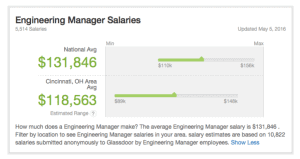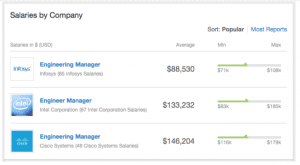
Are you Underpaid? 4 Resources to Know Your Worth in the Job Market
It wasn’t until I was negotiating a salary for an external job offer that I really came to understand my worth in the job market. I started my career with a chemical engineering salary of $60k in 2007. I felt like I had won the lottery to score this salary right out of college.
Over the next eight years, I received annual (merit) raises based on performance, career development raises that coincided with promotions, as well as a few “equity” raises. This put me just over the six-figure mark, leaving me feeling like a ROCK STAR!!
In 2015, I began pursuing potential external opportunities because my current company was based in another city, and I had reached the promotional ceiling for my location. After several interviews, it became apparent that I would receive an offer and I wanted to do my homework to make sure it would be a fair one. So I began with a quick internet search.
I was surprised by the initial results. They showed that I was being UNDERPAID!! Almost $2k per MONTH below the market underpaid. Like a new car, EVERY YEAR underpaid.
HOLD UP – What?? No!! How could this be?!?! I am an excellent employee, receiving regular praises from my manager, senior executives and everyone in between. I friggin’ make six-figures. This cannot be right.
Immediately, I started to justify this in my mind.
Well, I am the youngest of my peers. I *only* have 9 years of work experience, including my time as a co-op student. I work in a relatively stable organization in a relatively stable industry – maybe that means sacrificing some pay. I have great benefits, which included a 20% bonus based on individual, team and company performance. So maybe the lower salary was deserved.
I even started questioning if the fact that I was a woman was impacting this. This thought particularly pained me. My managers had always been men. In fact, the vast majority of my colleagues have always been men (part of being an engineer in an industrial setting). But they had ALWAYS been amazingly supportive – rewarding my performance both financially and with new opportunities.
I quickly snapped out of this and got back to reality. Your pay is based on two things and two things alone – your value in the job market and what you will accept.
I am going to repeat that.
Your pay is based on two things and two things alone – your value in the job market and what you will accept.
Want an easy way to determine YOUR worth in the job market? Just drop your info below to download the Compensation Comparison Spreadsheet for FREE!
Your market value will determine the high end of your pay range – it is rare that an employer would pay you more than the market – because why would they? And what you will accept creates the low end of your pay range. In an ideal world, these two (market value and accepted pay) would be the same.
The bottom line: I had created an artificially low pay range by accepting below-market compensation. Take some time to let that sink in. I had to.
But was the market really that much higher than my initial research showed? I did some more digging and sure enough, it was right. After utilizing several sources described below, and despite reaching rock star status in my own mind, I was really underpaid.
This eye-opening experience has provided me a much better position to begin salary discussions – both for internal and external opportunities. I have been able to negotiate higher salaries and better flexibility (sacrificing some pay), knowing not just the value that I bring to the work but also my worth in the market.
You should use several (or all) of the tools below to get the best indication of your value in the market. As with any research, you’ll want to have several sources pointing to the same thing to help verify and validate the results. Most of these give a salary range, based on several factors. Look for where the ranges overlap to help narrow-in on your specific value. I hope (for your sake) that you are right where you should be. But if not, knowledge is power! Check out these additional resources on how to negotiate your salary.
Happy researching!
Want an easy way to determine YOUR worth in the job market? Just drop your info below to download the Compensation Comparison Spreadsheet for FREE!
1. Online Resources
Does your salary fit within online salary tools?
My first step in evaluating my worth was, where else, by googling it. With a quick internet search I found two extremely helpful sites: Salary.com and GlassDoor.com. Both websites allow you to customize your search to your particular role and experience. Additionally, GlassDoor.com has anonymous, self-reporting of salary for specific roles and specific companies.
Salary.com
Here is an example of the results for Systems Consultant / Engineering Manager on Salary.com. What is really nice about Salary.com is that it allows you to customize, not just the role, but location and details about your background and experience.

Now, location is important. I live in the greater Cincinnati area – Burlington Kentucky to be specific. It is critical to include location because what an employer is willing to pay varies with the cost of living and competition, among other things. If, instead of Cincinnati, I was looking in the New York, NY area, the pay range and my customized projected salary would be very different – about $23k different.

Salary.com even allows you to take it a step further and view the median salary with bonus included.

Glassdoor.com
Glassdoor.com shows self-reported data based on role and company. It shows national and location specific averages and ranges based on thousands of self-reported anonymous salaries.

Additionally, if you are looking at a certain company, or (in my case) are anticipating a salary negotiation, you can see location and company specific data, as shown below.

This information from online salary websites is a great starting point for verifying the value you bring to an employer. However, it is just one data point and should be confirmed by other sources before you put too much weight into the result.
2. Trusted Friends and Colleagues
Do your friends (especially those working in HR) think you are underpaid?
Folks who work in human resources are privy to compensation details of many employees. They can provide a unique perspective on your value to an organization.
When negotiating my salary, I spoke with a friend, Carmin, who had previously worked for several years in HR. She confirmed that based on her experience employees in her company performing similar high-quality work had salaries much higher than mine.
Carmin had seen my work and leadership first-hand and could offer a knowledgeable, unbiased perspective. Her input was invaluable in boosting my confidence to ask for the salary I deserved!
So brainstorm folks that you know, preferably from another company, who would have access to salary information for your role. The more they know you and your capabilities the better! Obviously you would not want to ask for private information, but getting general range for folks like you is invaluable.
3. External Offer
Have you received an external job offer that is significantly higher than your current pay?
After over a half a dozen interviews, I received an offer from a manufacturing site in my area. Through early negotiation and salary discussions, their offer came in exactly at the low end of what I had named as my target range. And how did I determine the range? You guessed it – Salary.com, Glassdoor.com, feedback from a friend in HR, and my current compensation.
Receiving this external offer verified that I was in fact “worth” that amount. Through the various discussions and interviews, I had demonstrated to the company that I would bring that value to the organization.
4. Company Salary Range
Are you consistently on the low end of your company’s salary range?
Every couple of years, I would receive an unsolicited “equity” raise. This would happen because I was constantly riding the line of the low end of my company’s salary range for the work I was doing.
At first, I thought this a good thing. It is always nice to get a seemingly random, surprise raise, right? Sort of. Don’t get me wrong, my company was awesome to give me these raises. However, what it really means is that I had consistently been paid at a bargain rate compared to my peers.
Now, if I was consistently providing lower value to the organization, then that might be a fair salary. But with my performance record, it was really just an indication that I was being underpaid. Dang!
Once you have an understanding of your worth in the market, be careful how you use the information. You may suddenly feel dissatisfied or slighted, but try not to allow your emotions to control your actions. It is important that you approach any salary discussions with professionalism.
Balancing professionalism, gratitude for what you have, and fighting for what you deserve can be a slippery slope, so proceed with caution.
Also, keep in mind that salary is not everything. Commission, bonuses or profit sharing could be a significant portion of income for certain companies. Consider vacation, holidays, and other paid time off. Maybe the company has an awesome benefits package or contributes significantly to your retirement.
Don’t forget some of the less tangible ways that a company might compensate you. There is value there if the company affords you more flexibility and autonomy over your schedule. Maybe there are other perks such as a company car, free products, fitness memberships, or clothing reimbursement. These are all ways that a company can demonstrate that they value you, so it is critical to evaluate salary information within the frame of total compensation.
 Ask a question or send along a comment.
Please login to view and use the contact form.
Ask a question or send along a comment.
Please login to view and use the contact form.
Leave a Reply